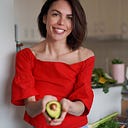Want to get Pregnant? Eat this!
The dos, don’ts and the maybes…in a nutshell
Almost every woman knows that it is important to eat well while you are pregnant. The benefit it provides you and your baby is invaluable. But, do you also know how important it is to eat well even before you get pregnant? If you are actively trying to get pregnant you have to make sure your body is prepared to accept the challenge. The first thing you should do before even beginning to try is to talk to your doctor to see how you measure up health wise. Does he think you need to lose a few pounds before getting pregnant or does he feel you need to gain a few? Your doctor may recommend that you change your eating habits and start exercising.
As soon as you decide you want a baby, you should begin to get in the habit of eating healthier. Slowly begin to cut out caffeine.
One of the first things most of us women prepare to say goodbye to once we see those two pink lines on our pregnancy tests is caffeine. Many women will stop their caffeine habit cold turkey out of the sheer fear of doing some sort of damage to the new life growing inside of them. These women will swear off anything that has caffeine in it from coffee, and soda to even chocolate. Then there are some of us who will still drink caffeine but cut back. Instead of drinking five cups of coffee a day, we might cut back to at least one cup of coffee to get us through the day.
Our mothers and grandmothers will probably tell us that they drank the same amount of caffeine pregnant as they did when they were not pregnant and their children turned out fine. However a lot more research has been done since their time and studies are showing that too much caffeine can cause some complications such as preterm labor and/or low birth weight.
So how much caffeine is too much caffeine? Doctors are telling their patients that a moderate amount of caffeine will not harm their babies. Even though caffeine does cross the placenta, anything less than 200 milligrams a day (an 8 ounce cup of strong coffee) will not do any harm. Anything over 200 milligrams puts your baby at risk and studies have also shown that women who drink more than 200 milligrams of caffeine a day during their first trimester have a slightly higher risk of a miscarriage.
Studies have also shown that women who had over 500 milligrams of caffeine a day had babies who had faster heart rates and faster breathing rates. These babies also spent more time awake in their first few days of life rather than peacefully sleeping after their long journey.
If you smoke, now is a good time to quit rather than waiting until you have that positive test. Smoking can decrease your fertility and increase your risk of a miscarriage if you are still smoking when you are pregnant.
Another thing you can do is to start taking prenatals or at least a multivitamin supplement that contains at least 600 micrograms of folic acid. You can also begin to add food into your diet that is rich in folate such as spinach and other green vegetables, peanuts, and orange juice. You can also start by taking a prenatal vitamin also. These vitamins contain iron, folic acid, and calcium along with vitamin C, D, B and vitamins B6 and B12 also.
Reevaluated your diet. Start to eat foods that have plenty of vitamins, minerals and fiber. Lay off the fat and excess sugar. You want to eat foods that have a high nutrient density. Eat at least five portions a day of fruits and vegetables along with protein and iron rich foods like dried fruit, and green vegetables. Try to steer clear of raw fish like sushi, and steer clear of undercook shellfish, meat or chicken. You also want to try to avoid fish that has high mercury content like swordfish, shark, or king mackerel. Cut out any food that has unpasteurized milk in it including cheeses such as brie, camembert, and some Mexican cheese. Also cut out foods that have raw egg in it including homemade cookie dough.
Make sure you up your water intake. Water should always be your first beverage choice before, after and during your pregnancy. Water helps to flush your system of toxins. Once you’ve gotten your eight glasses in, you can drink fruit and vegetable juices also.
Perhaps the most important thing you can do before you get pregnant is to cut out alcohol. The American College of Obstetricians and gynecologists have stated that women who drink might have a harder time getting pregnant than women who do not drink. Another reason why you should give up alcohol is that most birth defects that are caused by alcohol exposure usually occur in the first few weeks of pregnancy, usually before you even know you are pregnant.
Getting your body prepared for pregnancy is one of the best decisions you could make. Your body will be more prepared for the challenge of growing a baby and the experience will be a little easier on your body.
